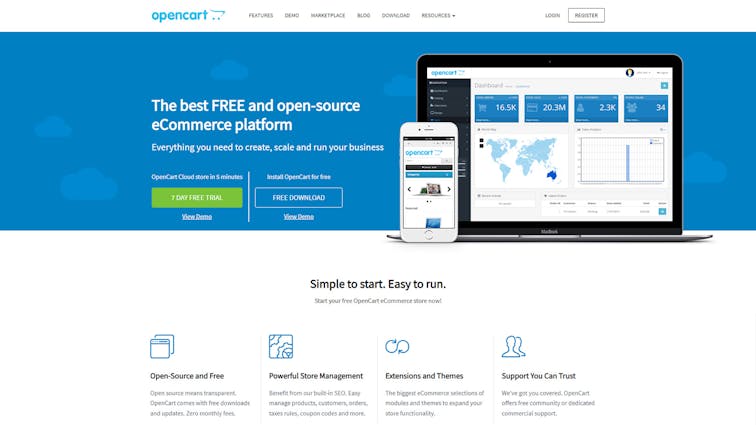
6 Best Open Source Ecommerce Platforms in 2025
Are you considering creating an ecommerce presence for your business and looking for a cost-effective solution?
Open source ecommerce platforms may be the answer you are looking for.
In this article, we will take a closer look at open source ecommerce platforms, their benefits, and how to choose the right one for your business.
What is an Open Source Ecommerce Platform?

An open source ecommerce platform is a software solution built on an open source framework, with freely available source code that businesses can modify and customize to meet their specific needs. This flexibility allows for a unique ecommerce experience tailored to the business, and at a lower cost compared to proprietary solutions.
Benefits of Open Source Ecommerce Platforms
Open source ecommerce platforms offer several benefits, including:
1. Flexibility
The flexibility of open source ecommerce platforms allows businesses to modify and customize the software to meet their specific needs, creating a unique ecommerce experience.
2. Scalability
Open source ecommerce platforms are highly scalable, allowing businesses to start small and grow their ecommerce presence over time. The platform can be adapted and scaled up to meet increased demand.
3. Cost-effectiveness
Open source ecommerce platforms are typically less expensive than proprietary solutions, as the software is free to use, and businesses only need to pay for hosting, maintenance, and support.
4. Community Support
Open source ecommerce platforms have a large and active community of developers, providing businesses with a wealth of knowledge and expertise when it comes to developing and customizing their ecommerce platform.
5. Control and Ownership
With an open-source ecommerce platform, you have complete control over your online store. You own your website and all its data, and you’re not tied to a specific hosting provider or platform. This control and ownership can provide peace of mind, especially in terms of data security and privacy.
6. SEO-Friendly
Most ecommerce platforms are designed with SEO in mind. They offer features like customizable URLs, meta tags, and sitemaps, which can help improve your website’s visibility in search engine results. Some platforms also support SEO plugins that can further enhance your site’s SEO.
Read More: 4 Simple SEO Strategies to Improve Your Rankings
7. Integration Capabilities
Open-source ecommerce platforms typically support a wide range of plugins and extensions, allowing you to integrate your online store with other systems and software. Whether you need to connect your ecommerce site to your inventory management system, your email marketing platform, or your customer relationship management (CRM) software, an open-source platform can make it happen.
Choosing the Right Open Source Ecommerce Platform
Choosing the right open source ecommerce platform for your business can be a challenging task. Here are some tips to help you make the right decision:
1. Consider Your Business Needs
Start by considering your business needs. What are your goals? What features do you require? What is your budget? By answering these questions, you can narrow down your options and find a platform that suits your business.
2. Research Your Options
Once you have a clear idea of your business needs, research your options. There are many open source ecommerce platforms available, each with its own strengths and weaknesses. Look for examples or case studies of businesses that have successfully used open source ecommerce platforms, read reviews, compare features, and evaluate the pros and cons of each platform.
3. Evaluate the Community
When evaluating open source ecommerce platforms, consider the community. This includes the number of developers working on the platform, the level of community support, and the availability of resources and documentation. A strong community can provide valuable support and resources for businesses using the platform.
4. Consider Integration Options
In addition to evaluating the platform itself, consider integration options. This includes the ability to integrate with third-party tools and services, such as payment gateways, shipping providers, and marketing automation tools. Integration options can have a big impact on the functionality and effectiveness of your ecommerce platform.
5. Evaluate Security and Support
Finally, consider security and support when choosing an open source ecommerce platform. This includes evaluating the platform’s security features, as well as the availability and quality of support and maintenance services. While open source ecommerce platforms can be secure, it’s important to assess the potential risks and downsides as well.
The Top 6 Open Source Ecommerce Platforms
Let’s take a closer look at some of the best open-source ecommerce platforms on the market.
1. WooCommerce

WooCommerce is a WordPress plugin that transforms your website into a powerful online store. It’s one of the most popular platforms globally, offering a setup wizard for all its features. While the plugin is free, you’ll need to handle installation, management, backup, and optimization.
Key Features:
- Free to use with WordPress
- Highly customizable, allowing for a unique storefront
- Wide range of themes available for various industries
- Extensive library of plugins and extensions to enhance functionality
- Multiple integrations supported
2. Adobe Commerce (Formerly Magento)

Adobe Commerce, formerly known as Magento, is an open-source platform known for its scalability and customizability. It’s a popular choice among retailers, offering website building, product catalog management, and marketing capabilities.
Key Features:
- 24/7 customer support
- API integrations
- Highly scalable, making it suitable for businesses of all sizes
- Extensive customization options, allowing for a unique storefront
- Supports multiple languages and currencies for global reach
- Seamless integration with various payment gateways
- Offers advanced marketing, SEO, and catalog-management tools
- Allows for mobile commerce with responsive design capabilities
3. Drupal Commerce

Drupal Commerce is an ecommerce platform built on the Drupal CMS. It’s popular with enterprise websites and offers a decent CMS feature for content ranking.
Key Features:
- SEO and marketing features
- Order management tools
- Supports multiple languages and currencies for global reach
- Reporting and analytics
- Seamless integration with various payment gateways
- Integration with other systems via RESTful API
4. Joomla

Joomla is an open-source CMS that allows you to develop and customize your eCommerce store with free plugins and templates. It’s similar to WordPress and requires different eCommerce plugins to build your website entirely.
Key Features:
- Highly customizable, allowing for a unique storefront design
- 6,000+ extensions available in the marketplace to add functionality
- Responsive design
- Good customer support
- Unlimited products
- Multiple language and currencies supported
- Access to a wide range of extensions
5. PrestaShop

PrestaShop is an open-source ecommerce platform built on Symfony. It offers a fully managed solution that pairs hosting and maintenance with their open-source software if you’re not tech-savvy.
Key Features:
- Thousands of modules and add-ons for increased functionality
- 3000+ mobile-optimized templates
- Easy to integrate 3rd party apps
- Integrated SEO and marketing tools
- Multi-currency support
6. OpenCart

OpenCart is a PHP-based open-source platform offering quick app installation and support for different types of extensions. It’s suitable for small and medium-sized businesses due to its local and global use optimization.
Key Features:
- Admin dashboard with a quick overview of features
- Backup and restore tools
- Plenty of integrations
- Support for abandoned shopping carts and discount coupons
- Mobile app
- Vast 13,000+ add-ons marketplace
- Recurring orders
Conclusion
Open source ecommerce platforms offer a flexible, scalable, and cost-effective solution for businesses looking to create an ecommerce presence.
By considering your business needs, researching your options, evaluating the community, considering integration options, and evaluating security and support, you can choose the right open source ecommerce platform for your business.
FAQ’s:
1. What is open-source ecommerce?
Open-source ecommerce refers to online retail platforms where the underlying source code is made available to the public. This allows developers to modify, customize, and enhance the platform according to their specific needs. Open-source ecommerce solutions are often preferred for their flexibility, cost-effectiveness, and community support, allowing businesses to create unique online shopping experiences.
2. What are some examples of open-source ecommerce platforms?
Some popular examples of open-source ecommerce platforms include:
- Magento: Known for its flexibility and scalability.
- WooCommerce: A WordPress plugin that turns a website into an online store.
- PrestaShop: Offers a wide range of features and customization options.
- OpenCart: User-friendly with a large selection of themes and extensions.
- osCommerce: One of the earliest open-source platforms, with a vast community.
- Zen Cart: Focuses on the needs of online store owners and shoppers.
- Drupal Commerce: Built on the Drupal content management system, offering robust integration.
These platforms provide various features and can be tailored to fit different business needs.
3. What is the best open-source B2B eCommerce platform?
Determining the “best” open-source B2B eCommerce platform depends on specific business requirements, such as scalability, customization, integration capabilities, and support. However, some widely recognized platforms for B2B eCommerce include:
- Magento: Offers robust B2B functionalities and is highly customizable.
- OroCommerce: Specifically designed for B2B ecommerce, with a strong focus on customer relationships and workflows.
- WooCommerce B2B Extension: Extends WooCommerce for B2B sales with specific features like bulk ordering.
It’s essential to evaluate the unique needs of the B2B operation and choose a platform that aligns with those requirements, considering factors like budget, technical expertise, and long-term goals.








